冀教版英语七年级上册Unit 6 Let's Go!知识点详解 (含答案)
文档属性
| 名称 | 冀教版英语七年级上册Unit 6 Let's Go!知识点详解 (含答案) |
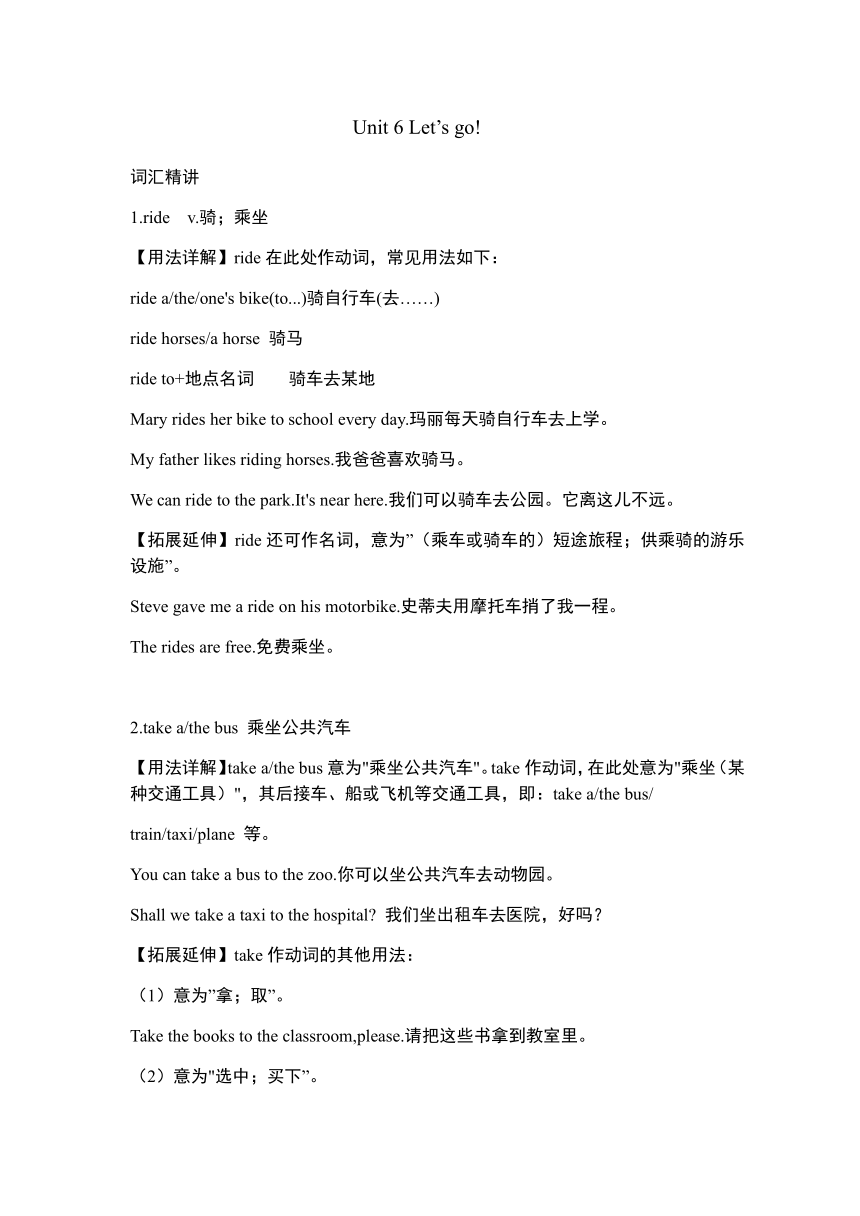
|
|
| 格式 | docx | ||
| 文件大小 | 56.5KB | ||
| 资源类型 | 教案 | ||
| 版本资源 | 冀教版 | ||
| 科目 | 英语 | ||
| 更新时间 | 2021-01-10 10:49:30 | ||
图片预览

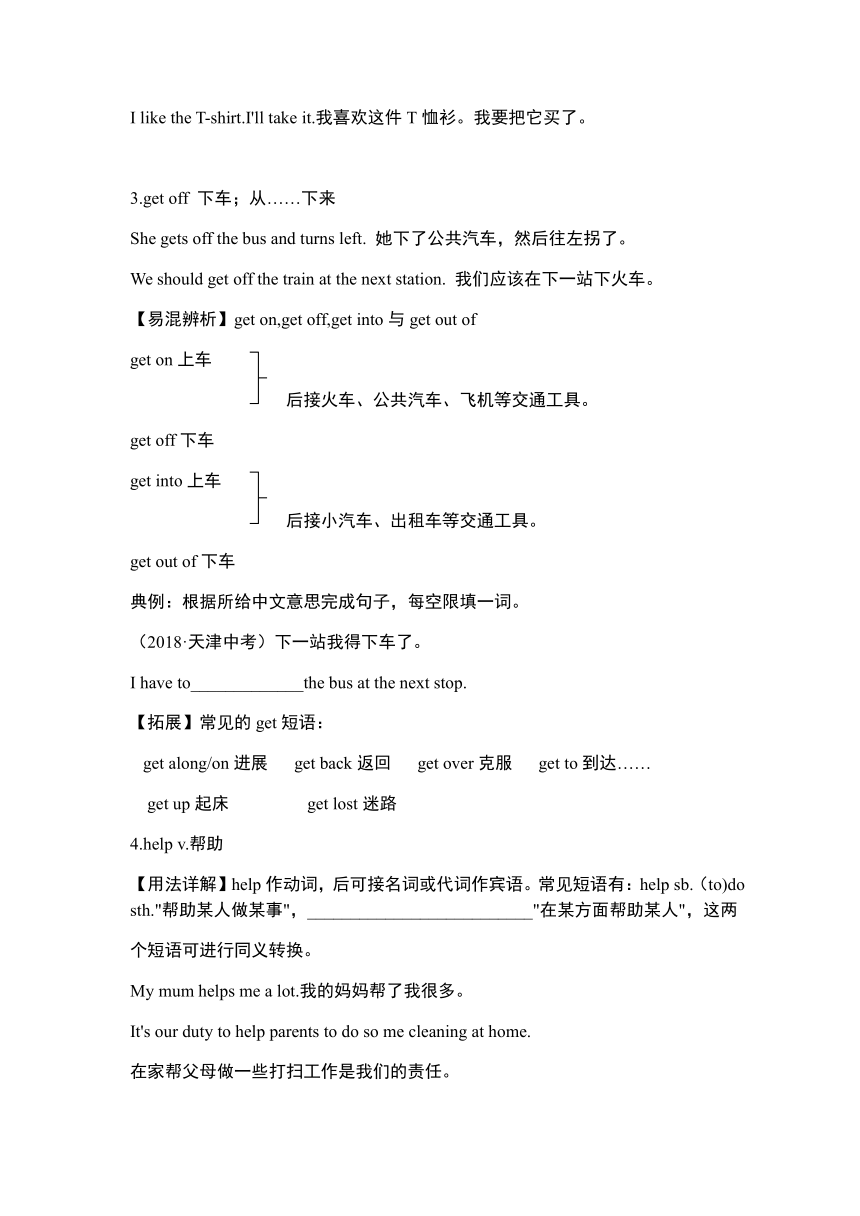
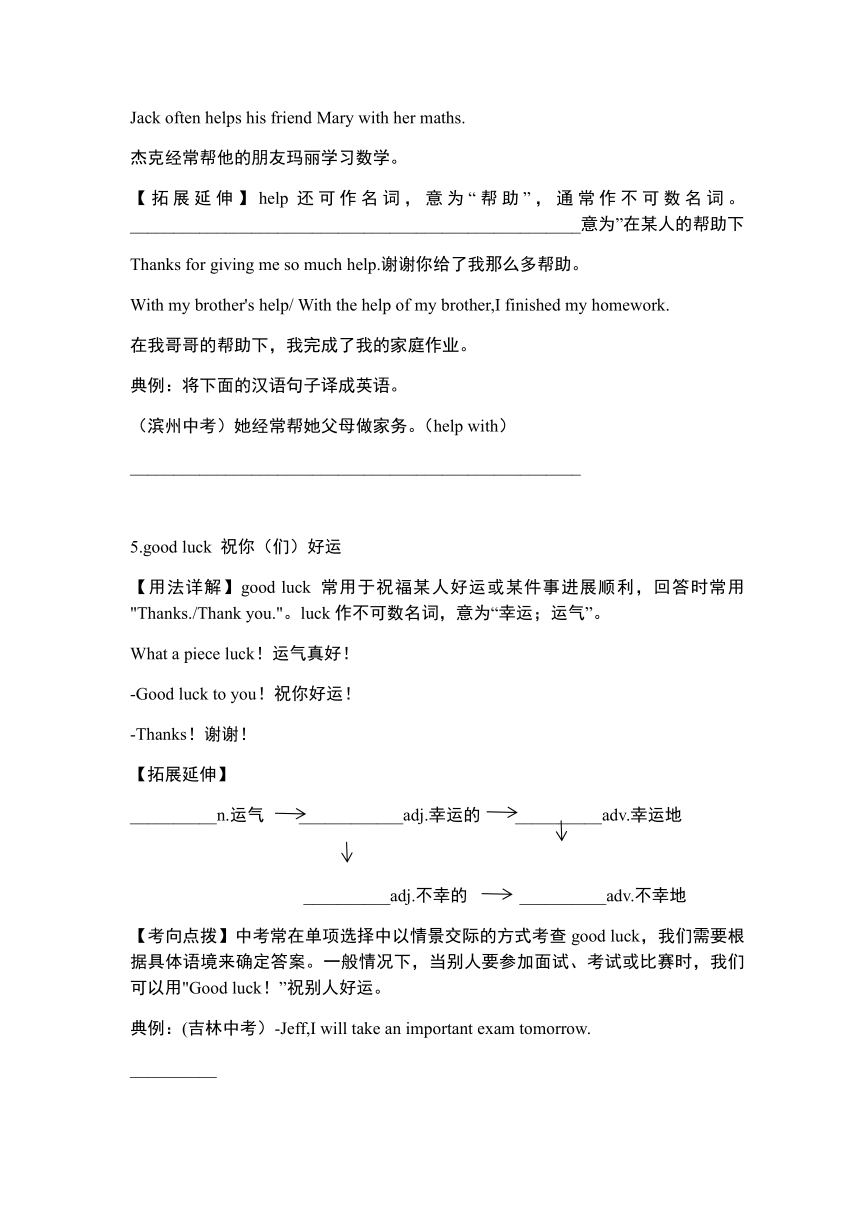
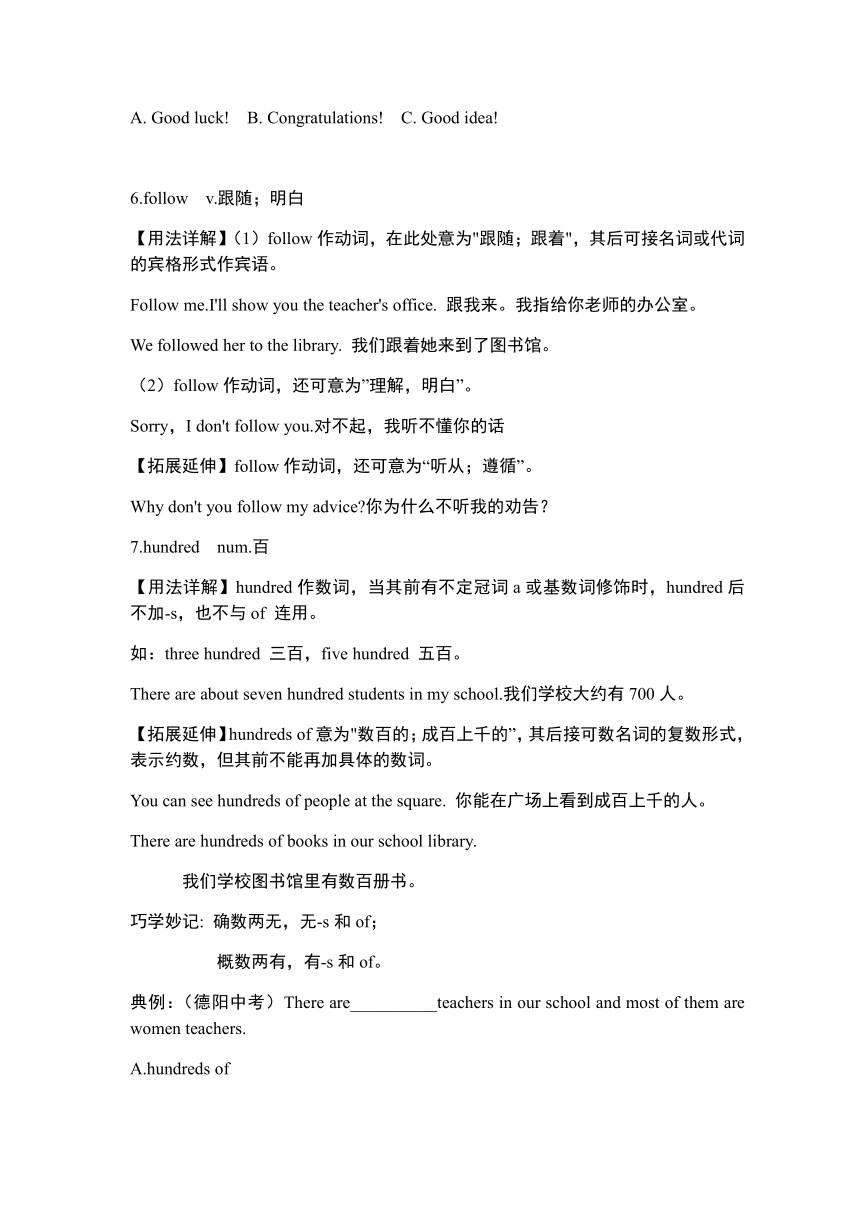
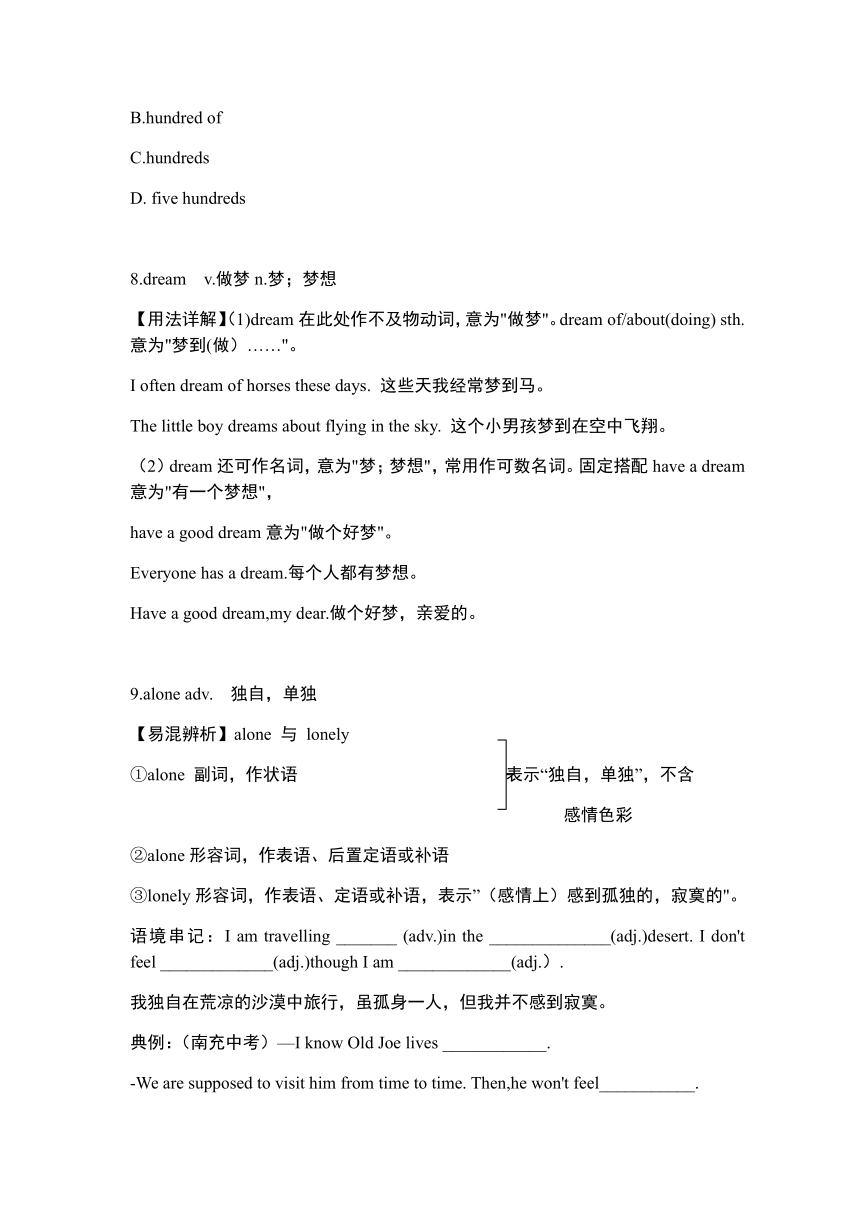
文档简介
Unit 6 Let’s go!
词汇精讲
1.ride v.骑;乘坐
【用法详解】ride在此处作动词,常见用法如下:
ride a/the/one's bike(to...)骑自行车(去……)
ride horses/a horse 骑马
ride to+地点名词 骑车去某地
Mary rides her bike to school every day.玛丽每天骑自行车去上学。
My father likes riding horses.我爸爸喜欢骑马。
We can ride to the park.It's near here.我们可以骑车去公园。它离这儿不远。
【拓展延伸】ride还可作名词,意为”(乘车或骑车的)短途旅程;供乘骑的游乐设施”。
Steve gave me a ride on his motorbike.史蒂夫用摩托车捎了我一程。
The rides are free.免费乘坐。
2.take a/the bus 乘坐公共汽车
【用法详解】take a/the bus意为"乘坐公共汽车"。take作动词,在此处意为"乘坐(某种交通工具)",其后接车、船或飞机等交通工具,即:take a/the bus/
train/taxi/plane 等。
You can take a bus to the zoo.你可以坐公共汽车去动物园。
Shall we take a taxi to the hospital? 我们坐出租车去医院,好吗?
【拓展延伸】take作动词的其他用法:
(1)意为”拿;取”。
Take the books to the classroom,please.请把这些书拿到教室里。
(2)意为"选中;买下”。
I like the T-shirt.I'll take it.我喜欢这件T恤衫。我要把它买了。
3.get off 下车;从……下来
She gets off the bus and turns left. 她下了公共汽车,然后往左拐了。
We should get off the train at the next station. 我们应该在下一站下火车。
【易混辨析】get on,get off,get into与get out of
105283053975
get on上车
后接火车、公共汽车、飞机等交通工具。
get off下车
105283043815
get into上车
后接小汽车、出租车等交通工具。
get out of下车
典例:根据所给中文意思完成句子,每空限填一词。
(2018·天津中考)下一站我得下车了。
I have to_____________the bus at the next stop.
【拓展】常见的get短语:
get along/on进展 get back返回 get over克服 get to到达……
get up起床 get lost迷路
4.help v.帮助
【用法详解】help作动词,后可接名词或代词作宾语。常见短语有:help sb.(to)do sth."帮助某人做某事",__________________________"在某方面帮助某人",这两
个短语可进行同义转换。
My mum helps me a lot.我的妈妈帮了我很多。
It's our duty to help parents to do so me cleaning at home.
在家帮父母做一些打扫工作是我们的责任。
Jack often helps his friend Mary with her maths.
杰克经常帮他的朋友玛丽学习数学。
【拓展延伸】help还可作名词,意为“帮助”,通常作不可数名词。____________________________________________________意为”在某人的帮助下
Thanks for giving me so much help.谢谢你给了我那么多帮助。
With my brother's help/ With the help of my brother,I finished my homework.
在我哥哥的帮助下,我完成了我的家庭作业。
典例:将下面的汉语句子译成英语。
(滨州中考)她经常帮她父母做家务。(help with)
____________________________________________________
5.good luck 祝你(们)好运
【用法详解】good luck 常用于祝福某人好运或某件事进展顺利,回答时常用"Thanks./Thank you."。luck作不可数名词,意为“幸运;运气”。
What a piece luck!运气真好!
-Good luck to you!祝你好运!
-Thanks!谢谢!
【拓展延伸】
37896801670053135630908051275080103505__________n.运气 ____________adj.幸运的 __________adv.幸运地
1903730635
3091180100965__________adj.不幸的 __________adv.不幸地
【考向点拨】中考常在单项选择中以情景交际的方式考查good luck,我们需要根据具体语境来确定答案。一般情况下,当别人要参加面试、考试或比赛时,我们可以用"Good luck!”祝别人好运。
典例:(吉林中考)-Jeff,I will take an important exam tomorrow.
__________
A. Good luck! B. Congratulations! C. Good idea!
6.follow v.跟随;明白
【用法详解】(1)follow作动词,在此处意为"跟随;跟着",其后可接名词或代词的宾格形式作宾语。
Follow me.I'll show you the teacher's office. 跟我来。我指给你老师的办公室。
We followed her to the library. 我们跟着她来到了图书馆。
(2)follow作动词,还可意为”理解,明白”。
Sorry,I don't follow you.对不起,我听不懂你的话
【拓展延伸】follow作动词,还可意为“听从;遵循”。
Why don't you follow my advice?你为什么不听我的劝告?
7.hundred num.百
【用法详解】hundred作数词,当其前有不定冠词a或基数词修饰时,hundred后不加-s,也不与of 连用。
如:three hundred 三百,five hundred 五百。
There are about seven hundred students in my school.我们学校大约有700人。
【拓展延伸】hundreds of意为"数百的;成百上千的”,其后接可数名词的复数形式,表示约数,但其前不能再加具体的数词。
You can see hundreds of people at the square. 你能在广场上看到成百上千的人。
There are hundreds of books in our school library.
我们学校图书馆里有数百册书。
巧学妙记: 确数两无,无-s和of;
概数两有,有-s和of。
典例:(德阳中考)There are__________teachers in our school and most of them are women teachers.
A.hundreds of
B.hundred of
C.hundreds
D. five hundreds
8.dream v.做梦n.梦;梦想
【用法详解】(1)dream在此处作不及物动词,意为"做梦"。dream of/about(doing) sth.意为"梦到(做)……"。
I often dream of horses these days. 这些天我经常梦到马。
The little boy dreams about flying in the sky. 这个小男孩梦到在空中飞翔。
(2)dream还可作名词,意为"梦;梦想",常用作可数名词。固定搭配have a dream意为"有一个梦想",
have a good dream意为"做个好梦"。
Everyone has a dream.每个人都有梦想。
Have a good dream,my dear.做个好梦,亲爱的。
9.alone adv. 独自,单独
3230880169545
【易混辨析】alone 与 lonely
①alone 副词,作状语 表示“独自,单独”,不含
感彩
②alone形容词,作表语、后置定语或补语
③lonely形容词,作表语、定语或补语,表示”(感情上)感到孤独的,寂寞的"。
语境串记:I am travelling _______ (adv.)in the ______________(adj.)desert. I don't feel _____________(adj.)though I am _____________(adj.).
我独自在荒凉的沙漠中旅行,虽孤身一人,但我并不感到寂寞。
典例:(南充中考)—I know Old Joe lives ____________.
-We are supposed to visit him from time to time. Then,he won't feel___________.
10.miss v.想念;错过
【用法详解】(1)miss作动词,在此处意为“想念”。
I miss all of you.我想念你们所有人。
Is the child missing his mother?这个孩子正在想念他的妈妈吗?
(2)miss作动词,还可意为“错过;未赶上”。
I don't want to miss the train. 我不想错过那趟火车。
He missed the last bus.他错过了最后一班公共汽车。
【拓展延伸】miss作名词,首字母大写时,意为”小姐,女士”,用于未婚女子姓氏前;也可用来称呼老师。
语境串记:Miss Green___________ her family, so she planned to go back home by coach. But it's a pity that she___________ the coach.格林小姐想念她的家人,所以她打算乘长途汽车回家,但遗憾的是她错过了那趟长途汽车。
11.afraid adj.害怕的;担心的
【用法详解】afraid在此作形容词,意为“害怕的”afraid的常见用法如下:
(1)_________________________________意为"害怕某人/某物"
I'm afraid of snakes. 我害怕蛇。
(2)_________________________________意为"不敢做某事(对做某事感到恐惧)”。
My grandmother is afraid to take the plane. 我奶奶害怕坐飞机。
(3)___________________________意为"担心某事会发生(但实际上未必会发生)”。
She is afraid of being late for class.她害怕上课迟到。
(4)________________________________意为"恐怕……",常用于表达婉转的拒绝。
I'm afraid that I can't go with you. 恐怕我不能和你们一起去了。
(5)I'm afraid so/not意为"恐怕是/不是这样"。
-Did you lose your purse? 你把钱包弄丢了?
-I'm afraid so.恐怕是这样。
-Can we leave now?我们现在可以离开吗?
--I'm afraid not. Look at the black clouds. It's going to rain.
恐怕不行。看乌云,马上要下雨了。
典例:(2018·安徽中考改编)-May I use your computer, Mr. Black?
__________.I'm using it.
A. Go ahead B.Thank you
C. Of course D. I'm afraid not
12.famous adj.著名的
【用法详解】famous是形容词,常用于名词前作定语,也可放在系动词后作表语。
She is a famous singer.她是一位著名的歌手。
The Great Wall is famous all over the world. 长城闻名于全世界。
【拓展延伸】与famous有关的常用搭配有:
_________________________因……而著名
_________________________作为……而闻名
Hangzhou is famous for the West Lake. 杭州因西湖而闻名。
Tu Youyou is famous as a scientist. 屠呦呦作为一名科学家而出名。
典例:将下面句子译成英语。
(苏州中考)这座城市以其美丽的园林而出名。
______________________________________________
13.movie n.电影
【用法详解】movie是可数名词,同义词为film。与movie相关的短语有:
______________________ 电影院
______________________ 去看电影
______________________ 动作/卡通电影
______________________ 看电影
Ferdinand is a very interesting movie.《公牛历险记》是一部非常有趣的电影。
She usually goes to the movies on Sunday afternoon.她通常周日下午去看电影。
14.fight v.& n.与……搏斗;打架
【用法详解】(1)fight在此处作及物动词,意为”与……搏斗”,后接代词宾格或名词作宾语。
He is fighting the thief. 他正在和小偷搏斗。
We will fight them in the game.在这场比赛中,我们将和他们搏斗。
(2)fight作名词,意为"打架;争吵",常用短语______________________意为"和某人打架/争吵"。
Don't have a fight with your friends.不要和你的朋友们吵架。
【拓展延伸】fight还可作不及物动词,意为”打仗;为……而斗争;争辩”,常见搭配有:
___________________为……而斗争
___________________与……作战
_______________________________因某事而与某人争辩
15.find out 查明;发现
【易混辨析】find out, find 与look for
①find out“查明;发现”,表示通过理解、分析、思考或询问等方式弄清楚、弄明白某件事。
②find"找到;发现”,强调"找”的结果。
③look for"寻找",是有目的地找,强调"寻找”这一动作,不一定能找到。
语境串记:My mobile phone is lost. I have _________________ it everywhere, but I can't _________________ it.Could you help me to_________________ where it is?我的手机丢了,我到处找,但是没找到,你能帮我查查它在哪里吗?
典例:(绥化中考)Where's my ruler?I can't_________________it anywhere.
A.look for
B. find out
C.find
16.in a/the tree 在树上
【用法详解】in a/the tree通常指外来的东西或人在树上,即不属于长在树上的东西。
You can see a bird in the tree.你能看到树上有一只鸟。
【拓展延伸】on a/the tree意为"在树上",通常指树本身所固有的东西,即树上长出来的东西,如叶子、果实等。
There are many apples on the apple tree.这棵苹果树上有很多苹果。
词汇精练
I、汉译英。
1. 下车________________ 2. 迷路________________
3. 在去……的路上________________ 4. 寻找________________
5. 紧邻,挨着________________ 6. 吵闹________________
7. 在农场________________ 8. 骑自行车________________
9. 找出,发现________________ 10. 乘坐1路公共汽车________________
II、根据句意及首字母或汉语提示,写出单词的正确形式。
1. She has no friends here. He feels l________________.
2. Dear Jenny, I ________________(想念) you very much.
3. Li Ming often r________________ his bike to school.
4. Please turn o________________ the light when you leave.
5. He d________________ of becoming a famous singer.
6. Go ________________(直的) and you can see the school.
7. Sixty plus f________________ is one hundred.
8. Would you like to see the ________________(电影) with me?
9. What’s the p________________ of the sweater?
10. Can you tell me the way to the ________________(机场)?
III、用括号中所给动词的适当形式填空。
1. — ____________ you ____________(clean) your bedroom?
— No, I’m not. I’m cleaning the living room.
2. Sometimes Lucy ____________(watch) TV. Now she ____________(watch) TV.
3. Look! There are two boys ____________(play) basketball on the playground.
4. The reading room is quiet. Everybody ____________(read) books or magazines.
5. Listen! Someone is ____________(sing) in the next room.
【参考答案】
I、汉译英。
1. get off 2. get lost 3. on the/one’s way to 4. look for 5. next to
6. make noises 7. on the farm 8. ride a bike 9. find out 10. take Bus 1
II、根据句意及首字母提示,写出单词的正确形式。
1. lonely 2. miss 3. rides 4. off 5. dreams 6. straight 7. forty
8. movie 9. price 10. airport
III、用括号中所给动词的适当形式填空。
1. Are; cleaning 2. watches; is watching 3. playing 4. is reading 5. Singing
句式精讲
① But they get lost on the way to the bookstore.
但是他们在去书店的路上迷路了。(教材P82)
②I lost my book.我把我的书弄丢了。(教材P83)
①lost 的用法
【用法详解】①句中的lost是形容词,意为”迷路的",get lost意为"迷路"。②句中的lost是动词lose的过去式,意为"丢失;失去”。
It's easy to get lost in a new city.在一个不熟悉的城市里很容易迷路。
I lost my pen.我的钢笔丢了。
【拓展延伸】lost作形容词,还有”失去的,丢失的”之意。
I want him to help me find my lost keys. 我想让他帮我找到我丢失的钥匙。
②on the/one's way to...在去……的路上
【用法详解】该短语中,to后接地点名词,one's要和主语在人称和数上保持一致。当后接home,there等地点副词时,则不要介词to。
There is a bookstore on the way to school. 在去学校的路上有一个书店。
You can see a park on your way to the train station.
在你去火车站的路上,你会看到一个公园。
I usually listen to music on my way home.我通常在回家的路上听音乐。
2.Can you tell me the way to the library?你能告诉我去图书馆的路吗?(教材P83)
Can you tell me the way to + 地点名词?
【用法详解】该句是问路的常用句型,意为“你能告诉我去……的路吗?",其中Can可以用Could代替,使语气更加委婉。
Can/Could you tell me the way to the museum?你能告诉我去博物馆的路吗?
【拓展延伸】常用的问路句型还有:
(1)Where is...?……在哪里?
(2) Is there...near here?附近有..吗?
(3)How can I get to...?我怎样才能到达……?
(4)What is the way to...?去……的路怎么走?
(5)Do you know where... is?你知道……在哪里吗?
(6)Could you show me the way to...? 你能指给我去……的路吗?
3.He has some friends to play with.他有一些一起玩的朋友了。(教材P87)
【句式剖析】
2081530176530115443019558051943017653081280182880He has some friends to play with.
主语 谓语 宾语 动词不定式短语作后置定语
【用法详解】to play with在此处作后置定语,修饰前面的名词friends。动词不定式(短语)作定语常放到被修饰词的后面。
I have some books to read.我有一些要读的书。
Would you like something to eat? 你想要些吃的吗?
4.I like to feed the animals and pick vegetables and fruit.我喜欢喂动物、采摘
蔬菜和水果。(教材P88)
①feed /fi:d/ v.喂; 喂养
【用法详解】feed为及物动词,后接名词或代词作宾语。常见搭配:
-3302036830
feed on 以……为食
feed sth.to sb./sth.给某人/某物喂某物
feed sb./sth.(on)sth.给某人/某物喂某物
Don't feed the animals in the zoo. 不要给动物园里的动物喂食。
Sheep feed on grass.羊以草为食。
I usually feed my baby (on) milk. = I usually feed milk to my baby.
我通常给我的孩子喂牛奶。
【拓展延伸】feed作动词,还有"养,养活(全家、一群人)”的意思。
I have a big family to feed.我有一大家子要养活。
②pick v.采摘;选择
【用法详解】(1)pick在此处作及物动词,意为“采摘”,后接名词或代词作宾语。
Don't pick the flowers in the garden.不要摘花园里的花。
(2)pick作动词,还可意为"选择"。
Pick a number from one to ten.从1到10中挑选一个数字。
【拓展延伸】pick up意为"捡起;拾起",当宾语为代词时,代词要放在pick与up中间;当宾语为名词时,可放在pick与up中间或up之后。
Mike picks up those books and puts them on the desk.
麦克捡起那些书并把它们放在书桌上。
5.They are eating very quickly.他们吃得很快。(教材P88)
①quickly adv.快;迅速
【用法详解】quickly是副词,修饰动词。其形容词形式为quick"快的,迅速的",反义词是slowly”慢地,缓慢地”。
He has breakfast quickly every morning.他每天早上吃早饭很快。
【易混辨析】quickly 与fast
①quickly侧重动作迅速、敏捷。
He quickly picks up the wallet on the ground. 他迅速拾起地上的钱夹。
②fast侧重速度快。
The car is running fast. 汽车跑得很快。
②sheep n.绵羊(教材 P89)
【用法详解】sheep作名词,其复数形式仍为sheep,通常我们把这种单数和复数形式一致的现象称为”单复同形”。
There is a sheep in the picture.画中有一只绵羊。
There are many sheep and cows on the farm.这个农场里有很多绵羊和奶牛。
【拓展延伸】单复同形的名词还有:Chinese(中国人);Japanese(日本人);deer(鹿)等。
6.But sometimes the price of the ticket is high.但是有时候票价很高。(教材P93)
①sometimes adv.有时
【用法详解】sometimes为副词,通常用于一般现在时,在句中的位置比较灵活。
I usually play basketball on weekends,but sometimes I swim.
在周末我通常打篮球,但有时我会游泳。
【易混辨析】sometimes,sometime,some time与some times
①sometimes频度副词,意为“有时”,表示动作发生的频率。
Sometimes he comes by bike and sometimes by bus.
他有时骑自行车来,有时乘公共汽车来。
②sometime副词,意为“在某时”,指过去或将来的某个不确定的时间。
I visited my grandpa sometime last week.
我上周某个时间看望了我的外公。(指过去的某个时间)
We can meet sometime next month.
我们可以下个月某个时间见一面。(指将来某个时间)
③some time意为"某时,一段时间”,作“某时"讲时,同sometime。
He will stay in Paris for some time.他将在巴黎待一段时间。
④some times意为“几次,几回”,time在此处表示“次,回”。
We have been to Shanghai some times.我们去过上海几次了。
②price n.价格;价值
【用法详解】price作名词,常见短语有:
________________的价格
________________以高价
________________以低价
I don't know the price of the coat. 我不知道这件外套的价格。
You can sell the computer at a high price.你可以高价卖掉这台电脑。
【拓展延伸】对价格提问可以用"What's the price of...?"或"How much...?"
句式精练
I.连词成句。
1. it’s, far, the, and, so, from, city
_____________________________________________________________________.
2. is, his, farm, Jack, visiting, uncle’s
______________________________________________________________________.
3. museum, many, paintings, this, has, famous
______________________________________________________________________.
4. can, about, history, war, we, learn, the, of
______________________________________________________________________.
5. will, the, Hall, your, you, see, War, on, left
______________________________________________________________________.
II、句型转换,每空一词。
1. How much for these books? (改为同义句)
____________ ____________ ____________ these books?
2. I feel happy. (用lonely改为选择疑问句)
____________ ____________ feel happy ____________ ____________?
3. Does Lucy eat apples? (改为现在进行时)
____________Lucy ____________ apples?
4. Jack walks to school. (改为同义句)
Jack ____________ to school ____________ ____________
5. We go to the market. (改为祈使句)
____________ ____________ to the market.
【参考答案】
I.连词成句。
1. And it’s so far from the city.
2. Jack is visiting his uncle’s farm.
3. This museum has many famous paintings.
4. We can learn about history of the war.
5. You will see the War Hall on your left.
II.句型转换,每空一词。
1. How much are 2. Do you; or lonely 3. Is; eating 4. goes; on foot 5. Let’s go
词汇精讲
1.ride v.骑;乘坐
【用法详解】ride在此处作动词,常见用法如下:
ride a/the/one's bike(to...)骑自行车(去……)
ride horses/a horse 骑马
ride to+地点名词 骑车去某地
Mary rides her bike to school every day.玛丽每天骑自行车去上学。
My father likes riding horses.我爸爸喜欢骑马。
We can ride to the park.It's near here.我们可以骑车去公园。它离这儿不远。
【拓展延伸】ride还可作名词,意为”(乘车或骑车的)短途旅程;供乘骑的游乐设施”。
Steve gave me a ride on his motorbike.史蒂夫用摩托车捎了我一程。
The rides are free.免费乘坐。
2.take a/the bus 乘坐公共汽车
【用法详解】take a/the bus意为"乘坐公共汽车"。take作动词,在此处意为"乘坐(某种交通工具)",其后接车、船或飞机等交通工具,即:take a/the bus/
train/taxi/plane 等。
You can take a bus to the zoo.你可以坐公共汽车去动物园。
Shall we take a taxi to the hospital? 我们坐出租车去医院,好吗?
【拓展延伸】take作动词的其他用法:
(1)意为”拿;取”。
Take the books to the classroom,please.请把这些书拿到教室里。
(2)意为"选中;买下”。
I like the T-shirt.I'll take it.我喜欢这件T恤衫。我要把它买了。
3.get off 下车;从……下来
She gets off the bus and turns left. 她下了公共汽车,然后往左拐了。
We should get off the train at the next station. 我们应该在下一站下火车。
【易混辨析】get on,get off,get into与get out of
105283053975
get on上车
后接火车、公共汽车、飞机等交通工具。
get off下车
105283043815
get into上车
后接小汽车、出租车等交通工具。
get out of下车
典例:根据所给中文意思完成句子,每空限填一词。
(2018·天津中考)下一站我得下车了。
I have to_____________the bus at the next stop.
【拓展】常见的get短语:
get along/on进展 get back返回 get over克服 get to到达……
get up起床 get lost迷路
4.help v.帮助
【用法详解】help作动词,后可接名词或代词作宾语。常见短语有:help sb.(to)do sth."帮助某人做某事",__________________________"在某方面帮助某人",这两
个短语可进行同义转换。
My mum helps me a lot.我的妈妈帮了我很多。
It's our duty to help parents to do so me cleaning at home.
在家帮父母做一些打扫工作是我们的责任。
Jack often helps his friend Mary with her maths.
杰克经常帮他的朋友玛丽学习数学。
【拓展延伸】help还可作名词,意为“帮助”,通常作不可数名词。____________________________________________________意为”在某人的帮助下
Thanks for giving me so much help.谢谢你给了我那么多帮助。
With my brother's help/ With the help of my brother,I finished my homework.
在我哥哥的帮助下,我完成了我的家庭作业。
典例:将下面的汉语句子译成英语。
(滨州中考)她经常帮她父母做家务。(help with)
____________________________________________________
5.good luck 祝你(们)好运
【用法详解】good luck 常用于祝福某人好运或某件事进展顺利,回答时常用"Thanks./Thank you."。luck作不可数名词,意为“幸运;运气”。
What a piece luck!运气真好!
-Good luck to you!祝你好运!
-Thanks!谢谢!
【拓展延伸】
37896801670053135630908051275080103505__________n.运气 ____________adj.幸运的 __________adv.幸运地
1903730635
3091180100965__________adj.不幸的 __________adv.不幸地
【考向点拨】中考常在单项选择中以情景交际的方式考查good luck,我们需要根据具体语境来确定答案。一般情况下,当别人要参加面试、考试或比赛时,我们可以用"Good luck!”祝别人好运。
典例:(吉林中考)-Jeff,I will take an important exam tomorrow.
__________
A. Good luck! B. Congratulations! C. Good idea!
6.follow v.跟随;明白
【用法详解】(1)follow作动词,在此处意为"跟随;跟着",其后可接名词或代词的宾格形式作宾语。
Follow me.I'll show you the teacher's office. 跟我来。我指给你老师的办公室。
We followed her to the library. 我们跟着她来到了图书馆。
(2)follow作动词,还可意为”理解,明白”。
Sorry,I don't follow you.对不起,我听不懂你的话
【拓展延伸】follow作动词,还可意为“听从;遵循”。
Why don't you follow my advice?你为什么不听我的劝告?
7.hundred num.百
【用法详解】hundred作数词,当其前有不定冠词a或基数词修饰时,hundred后不加-s,也不与of 连用。
如:three hundred 三百,five hundred 五百。
There are about seven hundred students in my school.我们学校大约有700人。
【拓展延伸】hundreds of意为"数百的;成百上千的”,其后接可数名词的复数形式,表示约数,但其前不能再加具体的数词。
You can see hundreds of people at the square. 你能在广场上看到成百上千的人。
There are hundreds of books in our school library.
我们学校图书馆里有数百册书。
巧学妙记: 确数两无,无-s和of;
概数两有,有-s和of。
典例:(德阳中考)There are__________teachers in our school and most of them are women teachers.
A.hundreds of
B.hundred of
C.hundreds
D. five hundreds
8.dream v.做梦n.梦;梦想
【用法详解】(1)dream在此处作不及物动词,意为"做梦"。dream of/about(doing) sth.意为"梦到(做)……"。
I often dream of horses these days. 这些天我经常梦到马。
The little boy dreams about flying in the sky. 这个小男孩梦到在空中飞翔。
(2)dream还可作名词,意为"梦;梦想",常用作可数名词。固定搭配have a dream意为"有一个梦想",
have a good dream意为"做个好梦"。
Everyone has a dream.每个人都有梦想。
Have a good dream,my dear.做个好梦,亲爱的。
9.alone adv. 独自,单独
3230880169545
【易混辨析】alone 与 lonely
①alone 副词,作状语 表示“独自,单独”,不含
感彩
②alone形容词,作表语、后置定语或补语
③lonely形容词,作表语、定语或补语,表示”(感情上)感到孤独的,寂寞的"。
语境串记:I am travelling _______ (adv.)in the ______________(adj.)desert. I don't feel _____________(adj.)though I am _____________(adj.).
我独自在荒凉的沙漠中旅行,虽孤身一人,但我并不感到寂寞。
典例:(南充中考)—I know Old Joe lives ____________.
-We are supposed to visit him from time to time. Then,he won't feel___________.
10.miss v.想念;错过
【用法详解】(1)miss作动词,在此处意为“想念”。
I miss all of you.我想念你们所有人。
Is the child missing his mother?这个孩子正在想念他的妈妈吗?
(2)miss作动词,还可意为“错过;未赶上”。
I don't want to miss the train. 我不想错过那趟火车。
He missed the last bus.他错过了最后一班公共汽车。
【拓展延伸】miss作名词,首字母大写时,意为”小姐,女士”,用于未婚女子姓氏前;也可用来称呼老师。
语境串记:Miss Green___________ her family, so she planned to go back home by coach. But it's a pity that she___________ the coach.格林小姐想念她的家人,所以她打算乘长途汽车回家,但遗憾的是她错过了那趟长途汽车。
11.afraid adj.害怕的;担心的
【用法详解】afraid在此作形容词,意为“害怕的”afraid的常见用法如下:
(1)_________________________________意为"害怕某人/某物"
I'm afraid of snakes. 我害怕蛇。
(2)_________________________________意为"不敢做某事(对做某事感到恐惧)”。
My grandmother is afraid to take the plane. 我奶奶害怕坐飞机。
(3)___________________________意为"担心某事会发生(但实际上未必会发生)”。
She is afraid of being late for class.她害怕上课迟到。
(4)________________________________意为"恐怕……",常用于表达婉转的拒绝。
I'm afraid that I can't go with you. 恐怕我不能和你们一起去了。
(5)I'm afraid so/not意为"恐怕是/不是这样"。
-Did you lose your purse? 你把钱包弄丢了?
-I'm afraid so.恐怕是这样。
-Can we leave now?我们现在可以离开吗?
--I'm afraid not. Look at the black clouds. It's going to rain.
恐怕不行。看乌云,马上要下雨了。
典例:(2018·安徽中考改编)-May I use your computer, Mr. Black?
__________.I'm using it.
A. Go ahead B.Thank you
C. Of course D. I'm afraid not
12.famous adj.著名的
【用法详解】famous是形容词,常用于名词前作定语,也可放在系动词后作表语。
She is a famous singer.她是一位著名的歌手。
The Great Wall is famous all over the world. 长城闻名于全世界。
【拓展延伸】与famous有关的常用搭配有:
_________________________因……而著名
_________________________作为……而闻名
Hangzhou is famous for the West Lake. 杭州因西湖而闻名。
Tu Youyou is famous as a scientist. 屠呦呦作为一名科学家而出名。
典例:将下面句子译成英语。
(苏州中考)这座城市以其美丽的园林而出名。
______________________________________________
13.movie n.电影
【用法详解】movie是可数名词,同义词为film。与movie相关的短语有:
______________________ 电影院
______________________ 去看电影
______________________ 动作/卡通电影
______________________ 看电影
Ferdinand is a very interesting movie.《公牛历险记》是一部非常有趣的电影。
She usually goes to the movies on Sunday afternoon.她通常周日下午去看电影。
14.fight v.& n.与……搏斗;打架
【用法详解】(1)fight在此处作及物动词,意为”与……搏斗”,后接代词宾格或名词作宾语。
He is fighting the thief. 他正在和小偷搏斗。
We will fight them in the game.在这场比赛中,我们将和他们搏斗。
(2)fight作名词,意为"打架;争吵",常用短语______________________意为"和某人打架/争吵"。
Don't have a fight with your friends.不要和你的朋友们吵架。
【拓展延伸】fight还可作不及物动词,意为”打仗;为……而斗争;争辩”,常见搭配有:
___________________为……而斗争
___________________与……作战
_______________________________因某事而与某人争辩
15.find out 查明;发现
【易混辨析】find out, find 与look for
①find out“查明;发现”,表示通过理解、分析、思考或询问等方式弄清楚、弄明白某件事。
②find"找到;发现”,强调"找”的结果。
③look for"寻找",是有目的地找,强调"寻找”这一动作,不一定能找到。
语境串记:My mobile phone is lost. I have _________________ it everywhere, but I can't _________________ it.Could you help me to_________________ where it is?我的手机丢了,我到处找,但是没找到,你能帮我查查它在哪里吗?
典例:(绥化中考)Where's my ruler?I can't_________________it anywhere.
A.look for
B. find out
C.find
16.in a/the tree 在树上
【用法详解】in a/the tree通常指外来的东西或人在树上,即不属于长在树上的东西。
You can see a bird in the tree.你能看到树上有一只鸟。
【拓展延伸】on a/the tree意为"在树上",通常指树本身所固有的东西,即树上长出来的东西,如叶子、果实等。
There are many apples on the apple tree.这棵苹果树上有很多苹果。
词汇精练
I、汉译英。
1. 下车________________ 2. 迷路________________
3. 在去……的路上________________ 4. 寻找________________
5. 紧邻,挨着________________ 6. 吵闹________________
7. 在农场________________ 8. 骑自行车________________
9. 找出,发现________________ 10. 乘坐1路公共汽车________________
II、根据句意及首字母或汉语提示,写出单词的正确形式。
1. She has no friends here. He feels l________________.
2. Dear Jenny, I ________________(想念) you very much.
3. Li Ming often r________________ his bike to school.
4. Please turn o________________ the light when you leave.
5. He d________________ of becoming a famous singer.
6. Go ________________(直的) and you can see the school.
7. Sixty plus f________________ is one hundred.
8. Would you like to see the ________________(电影) with me?
9. What’s the p________________ of the sweater?
10. Can you tell me the way to the ________________(机场)?
III、用括号中所给动词的适当形式填空。
1. — ____________ you ____________(clean) your bedroom?
— No, I’m not. I’m cleaning the living room.
2. Sometimes Lucy ____________(watch) TV. Now she ____________(watch) TV.
3. Look! There are two boys ____________(play) basketball on the playground.
4. The reading room is quiet. Everybody ____________(read) books or magazines.
5. Listen! Someone is ____________(sing) in the next room.
【参考答案】
I、汉译英。
1. get off 2. get lost 3. on the/one’s way to 4. look for 5. next to
6. make noises 7. on the farm 8. ride a bike 9. find out 10. take Bus 1
II、根据句意及首字母提示,写出单词的正确形式。
1. lonely 2. miss 3. rides 4. off 5. dreams 6. straight 7. forty
8. movie 9. price 10. airport
III、用括号中所给动词的适当形式填空。
1. Are; cleaning 2. watches; is watching 3. playing 4. is reading 5. Singing
句式精讲
① But they get lost on the way to the bookstore.
但是他们在去书店的路上迷路了。(教材P82)
②I lost my book.我把我的书弄丢了。(教材P83)
①lost 的用法
【用法详解】①句中的lost是形容词,意为”迷路的",get lost意为"迷路"。②句中的lost是动词lose的过去式,意为"丢失;失去”。
It's easy to get lost in a new city.在一个不熟悉的城市里很容易迷路。
I lost my pen.我的钢笔丢了。
【拓展延伸】lost作形容词,还有”失去的,丢失的”之意。
I want him to help me find my lost keys. 我想让他帮我找到我丢失的钥匙。
②on the/one's way to...在去……的路上
【用法详解】该短语中,to后接地点名词,one's要和主语在人称和数上保持一致。当后接home,there等地点副词时,则不要介词to。
There is a bookstore on the way to school. 在去学校的路上有一个书店。
You can see a park on your way to the train station.
在你去火车站的路上,你会看到一个公园。
I usually listen to music on my way home.我通常在回家的路上听音乐。
2.Can you tell me the way to the library?你能告诉我去图书馆的路吗?(教材P83)
Can you tell me the way to + 地点名词?
【用法详解】该句是问路的常用句型,意为“你能告诉我去……的路吗?",其中Can可以用Could代替,使语气更加委婉。
Can/Could you tell me the way to the museum?你能告诉我去博物馆的路吗?
【拓展延伸】常用的问路句型还有:
(1)Where is...?……在哪里?
(2) Is there...near here?附近有..吗?
(3)How can I get to...?我怎样才能到达……?
(4)What is the way to...?去……的路怎么走?
(5)Do you know where... is?你知道……在哪里吗?
(6)Could you show me the way to...? 你能指给我去……的路吗?
3.He has some friends to play with.他有一些一起玩的朋友了。(教材P87)
【句式剖析】
2081530176530115443019558051943017653081280182880He has some friends to play with.
主语 谓语 宾语 动词不定式短语作后置定语
【用法详解】to play with在此处作后置定语,修饰前面的名词friends。动词不定式(短语)作定语常放到被修饰词的后面。
I have some books to read.我有一些要读的书。
Would you like something to eat? 你想要些吃的吗?
4.I like to feed the animals and pick vegetables and fruit.我喜欢喂动物、采摘
蔬菜和水果。(教材P88)
①feed /fi:d/ v.喂; 喂养
【用法详解】feed为及物动词,后接名词或代词作宾语。常见搭配:
-3302036830
feed on 以……为食
feed sth.to sb./sth.给某人/某物喂某物
feed sb./sth.(on)sth.给某人/某物喂某物
Don't feed the animals in the zoo. 不要给动物园里的动物喂食。
Sheep feed on grass.羊以草为食。
I usually feed my baby (on) milk. = I usually feed milk to my baby.
我通常给我的孩子喂牛奶。
【拓展延伸】feed作动词,还有"养,养活(全家、一群人)”的意思。
I have a big family to feed.我有一大家子要养活。
②pick v.采摘;选择
【用法详解】(1)pick在此处作及物动词,意为“采摘”,后接名词或代词作宾语。
Don't pick the flowers in the garden.不要摘花园里的花。
(2)pick作动词,还可意为"选择"。
Pick a number from one to ten.从1到10中挑选一个数字。
【拓展延伸】pick up意为"捡起;拾起",当宾语为代词时,代词要放在pick与up中间;当宾语为名词时,可放在pick与up中间或up之后。
Mike picks up those books and puts them on the desk.
麦克捡起那些书并把它们放在书桌上。
5.They are eating very quickly.他们吃得很快。(教材P88)
①quickly adv.快;迅速
【用法详解】quickly是副词,修饰动词。其形容词形式为quick"快的,迅速的",反义词是slowly”慢地,缓慢地”。
He has breakfast quickly every morning.他每天早上吃早饭很快。
【易混辨析】quickly 与fast
①quickly侧重动作迅速、敏捷。
He quickly picks up the wallet on the ground. 他迅速拾起地上的钱夹。
②fast侧重速度快。
The car is running fast. 汽车跑得很快。
②sheep n.绵羊(教材 P89)
【用法详解】sheep作名词,其复数形式仍为sheep,通常我们把这种单数和复数形式一致的现象称为”单复同形”。
There is a sheep in the picture.画中有一只绵羊。
There are many sheep and cows on the farm.这个农场里有很多绵羊和奶牛。
【拓展延伸】单复同形的名词还有:Chinese(中国人);Japanese(日本人);deer(鹿)等。
6.But sometimes the price of the ticket is high.但是有时候票价很高。(教材P93)
①sometimes adv.有时
【用法详解】sometimes为副词,通常用于一般现在时,在句中的位置比较灵活。
I usually play basketball on weekends,but sometimes I swim.
在周末我通常打篮球,但有时我会游泳。
【易混辨析】sometimes,sometime,some time与some times
①sometimes频度副词,意为“有时”,表示动作发生的频率。
Sometimes he comes by bike and sometimes by bus.
他有时骑自行车来,有时乘公共汽车来。
②sometime副词,意为“在某时”,指过去或将来的某个不确定的时间。
I visited my grandpa sometime last week.
我上周某个时间看望了我的外公。(指过去的某个时间)
We can meet sometime next month.
我们可以下个月某个时间见一面。(指将来某个时间)
③some time意为"某时,一段时间”,作“某时"讲时,同sometime。
He will stay in Paris for some time.他将在巴黎待一段时间。
④some times意为“几次,几回”,time在此处表示“次,回”。
We have been to Shanghai some times.我们去过上海几次了。
②price n.价格;价值
【用法详解】price作名词,常见短语有:
________________的价格
________________以高价
________________以低价
I don't know the price of the coat. 我不知道这件外套的价格。
You can sell the computer at a high price.你可以高价卖掉这台电脑。
【拓展延伸】对价格提问可以用"What's the price of...?"或"How much...?"
句式精练
I.连词成句。
1. it’s, far, the, and, so, from, city
_____________________________________________________________________.
2. is, his, farm, Jack, visiting, uncle’s
______________________________________________________________________.
3. museum, many, paintings, this, has, famous
______________________________________________________________________.
4. can, about, history, war, we, learn, the, of
______________________________________________________________________.
5. will, the, Hall, your, you, see, War, on, left
______________________________________________________________________.
II、句型转换,每空一词。
1. How much for these books? (改为同义句)
____________ ____________ ____________ these books?
2. I feel happy. (用lonely改为选择疑问句)
____________ ____________ feel happy ____________ ____________?
3. Does Lucy eat apples? (改为现在进行时)
____________Lucy ____________ apples?
4. Jack walks to school. (改为同义句)
Jack ____________ to school ____________ ____________
5. We go to the market. (改为祈使句)
____________ ____________ to the market.
【参考答案】
I.连词成句。
1. And it’s so far from the city.
2. Jack is visiting his uncle’s farm.
3. This museum has many famous paintings.
4. We can learn about history of the war.
5. You will see the War Hall on your left.
II.句型转换,每空一词。
1. How much are 2. Do you; or lonely 3. Is; eating 4. goes; on foot 5. Let’s go
同课章节目录
- Unit 1 School and friends
- Lesson 1 Hello!
- Lesson 2 Teacher and Students
- Lesson 3 Welcome to Our School
- Lesson 4 What Is It?
- Lesson 5 May I Have a Book?
- Lesson 6 Things for School
- Unit 2 Colours and Clothes
- Lesson 7 Jenny's New Skirt
- Lesson 8 Danny's Favourit Colou
- Lesson 9 Whose Coat Is This?
- Lesson 10 Clothes for a Cold Day
- Lesson 11 Clothes around the World
- Lesson 12 Let's Go Shopping!
- Unit 3 Body Parts and Feelings
- Lesson 13 Body Parts
- Lesson 14 Colours and Feelings
- Lesson 15 Tall or Short
- Lesson 16 Happy or Sad
- Lesson 17 Seeing a Docto
- Lesson 18 We All Look Different!
- Unit 4 Food and Restaurants
- Lesson 19 Time for Breakfast!
- Lesson 20 I Like the Supermarket!
- Lesson 21 At the Market
- Lesson 22 In the Restaurant
- Lesson 23 The Corner Store
- Lesson 24 Eat Good Food!
- Unit 5 Family and Home
- Lesson 25 Jenny's Family
- Lesson 26 Li Ming's Family
- Lesson 27 Danny at Home
- Lesson 28 A Family Picnic
- Lesson 29 A Birthday Card
- Lesson 30 Grandma's Birthday Party
- Unit 6 Let's Go!
- Lesson 31 Let's Go to the Bookstore!
- Lesson 32 At the Supermarket
- Lesson 33 Let's Go to the Zoo!
- Lesson 34 On the Farm
- Lesson 35 Let's Go to the Museum!
- Lesson 36 Let's Go to the Movie Theatre!
- Unit 7 Days and Months
- Lesson 37 Seasons and Weathe
- Lesson 38 Nick's Busy Month
- Lesson 39 A Class Calenda
- Lesson 40 When Is Your Birthday?
- Lesson 41 Holidays
- Lesson 42 Happy Holidays!
- Unit 8 Countries around the world
- Lesson 43 Directions
- Lesson 44 Jack's Goodbye Party
- Lesson 45 China
- Lesson 46 Canada and the U.S.
- Lesson 47 The U.K. and Australia
- Lesson 48 English-Speaking Countries
